
by emilie.cremin@gmail.com | Oct 3, 2025 | Upcoming Events
Riverine, deltaic and coastal areas of South Asia are frequently affected by hydrometeorological hazards such as cyclones, floods and storm surges: these recurring events damage agricultural production and public and private infrastructure. As a result, erosion of the coasts and banks has led to the displacement of many villages. For this panel, we are seeking contributions examining the adaptive strategies deployed by different categories of stakeholders to cope and adapt to hazards. The effectiveness of public management of hazards through structural (extension of embankments, construction of shelters, etc.) and non-structural (awareness raising, support for adaptive strategies, etc.), individual and collective strategies based on agricultural adaptations and agro-ecological technologies used in rice or shrimp farming, nature-based solutions initiatives, coastal or river restoration practices and other alternatives are all being called into question. Overall, we aim to create a site-based knowledge exchange that critically addresses the issue of adaptation by examining power relations between public and private sector actors to highlight the limitations of strategies adaptation. We thus wish to examine the source of the problem that considers the hydrosocial cycle and the social, economic and ecological situations to support sustainable reconstruction in spaces exposed to multiple risks.
Presentations
Selim Samiya – Center for Sustainable Development, University of Liberal Arts Bangladesh, Dhaka, Bangladesh
Islam Nurul – Sajida Foundation, Sajida Foundation, Dhaka, Bangladesh
This paper examines the critical role of place-based, localized governance systems for protecting and restoring commons i.e access to land access and water systems that benefit communities over corporate investment. It highlights the importance of community-centric governance approaches and bottom-up policy frameworks in fostering resilience by returning the rights of commons to the communities.The study emphasizes the need for localized governance of commons and a bottom-up policy approach to enhance social resilience of coastal communities facing the complex dual challenges of climate change and human intervention. By analyzing the role of the local governance system in managing shared resources, the paper aims to provide actionable insights for policymakers, practitioners, and community stakeholders involved in common resource management and policy formulation.
Theocharis Angelos – Department of Media, Culture, Heritage, Newcastle University, Newcastle Upon Tyne, United Kingdom
Indigenous worldviews encompass nuanced understandings of cultural adaptation, recognising change as an intrinsic part of sustaining living cultures and landscapes amid environmental shifts. Many Indigenous communities perceive time as cyclical, fostering continuity and resilience through transformation. This paper examines Indigenous adaptation strategies in deltaic environments, where climate crisis exacerbates existing ecological vulnerabilities. Drawing on Indigenous films from the Ganges-Brahmaputra-Meghna Delta in Bangladesh, the Red River and the Mekong Deltas in Vietnam, I will explore how Indigenous narratives illustrate adaptation as a complex interplay of loss, resilience, and innovation. Dao filmmakers in Vietnam document shifts in traditional cultural practices due to resource scarcity. Khmer communities in the Mekong Delta, facing soil salinization and erratic weather, adopt alternative livelihoods. The Munda people of Bangladesh, displaced by climate disasters, navigate transformations in social and economic practices while maintaining cultural identity. This paper argues that Indigenous strategies frame adaptation as a relational, forward-looking process that integrates cultural continuity with necessary transformations.
Crémin Emilie – Instititute of Geography and suistainability – IGD, University of Lausanne, Lausanne, Switzerland
Souradip Pathak – IIT Kharagpur, Kharagpur, Kharagpur, India
Tapas Mondal – SJSM, NGO, Kolkata, India
This article delves into the environmental history of ādivāsī communities, including the Munda and Santal, who rely on the Indian Sundarbans for their livelihoods. Displaced during colonial rule, these communities have since developed a symbiotic relationship with the forest, acquiring extensive ecological knowledge critical for its preservation. Despite their expertise, ādivāsī communities face severe challenges from recurrent
geophysical and human-made hazards. In addition, they also face significant socioeconomic challenges. They are among the poorest and most vulnerable groups in India, with limited access to education, healthcare, and economic opportunities. Their exclusion from forest areas, driven by conservation policies and development projects, has further undermined their livelihoods. Their vulnerability is exacerbated by socioeconomic
marginalisation, exclusion from forest areas, and the impacts of development projects like tourism and industrialisation.
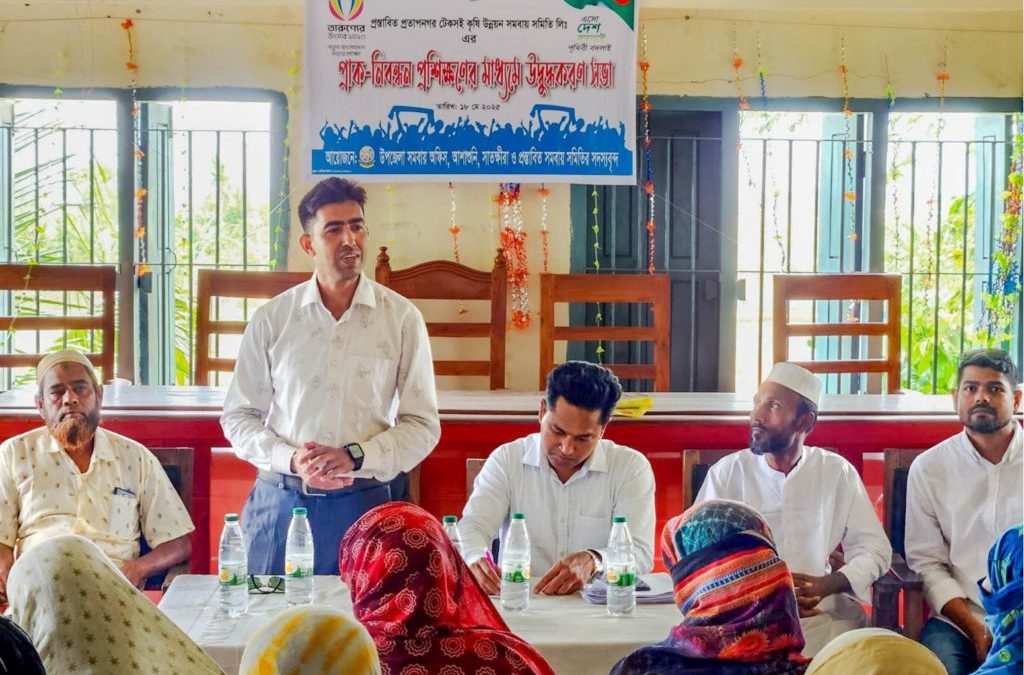
by emilie.cremin@gmail.com | May 20, 2025 | Previous Events
Consultation Meeting on Farmer Cooperatives in Pratap Nagar, Assasuni initiated by the Dept. of Cooperatives, GoB, and SAJIDA Foundation Host
Department of Cooperatives, Govt. of Bangladesh, and SAJIDA Foundation jointly organized an important consultation meeting on Sunday, 18 May 2025 in Protapnagar, Assasuni Upazila, aimed at empowering local farmers. The event sought to raise awareness on the benefits of cooperative-based organizations and the government procedures for official registration.
Technical support for the event was provided by SAJIDA Foundation’s Living Lab office under the “ENGAGE: Eliciting Needs-based Grassroots Action through Cross-Group Engagement” (ENGAGE4Sundarbans) project.
Assistant Cooperative Officer Md. Tanvir Hossain, Cooperative Inspector Sannasi Kumar Mondal, Union Councill Chairperson Abu Daud Dhali, respected community figures, SAJIDA Foundation’s research team, and 30 farmers from the ENGAGE project participated in the consultation meeting.
The meeting with cooperative officials introducing themselves and setting the context for the day. An overview of the ENGAGE project’s goals was shared, laying the foundation for a collaborative dialogue between government representatives and farmers.
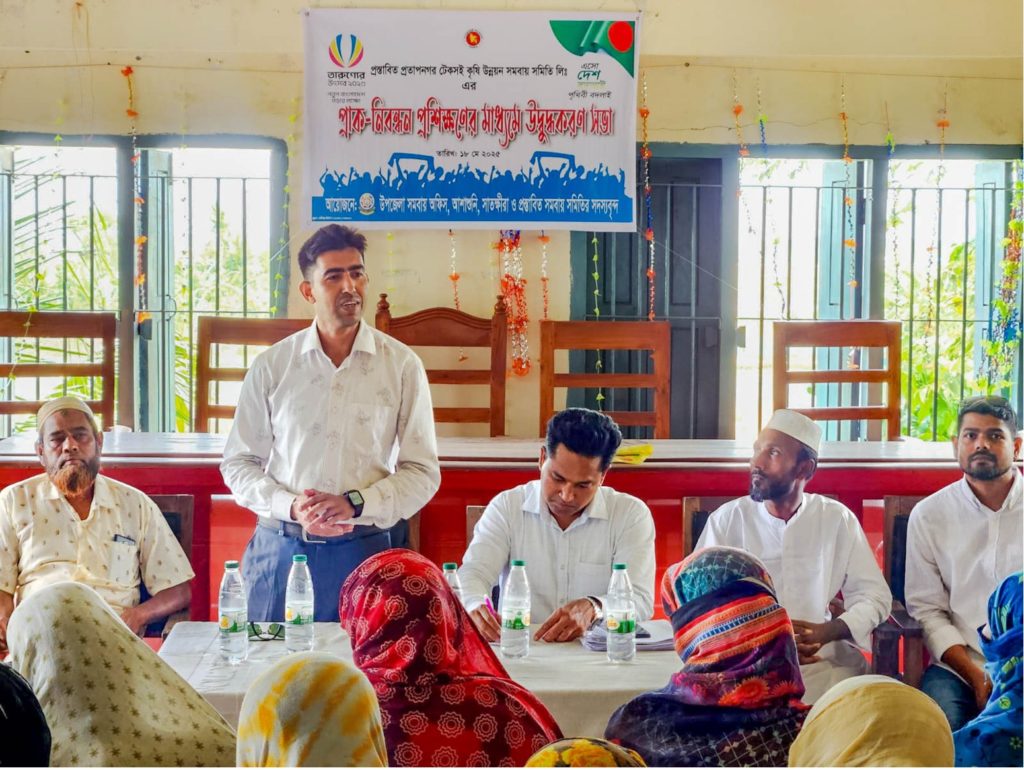
Cooperative Inspector Sannasi Kumar Mondal took the floor to explain the concept of cooperative societies. He walked the participants through the history, structure, and purpose of cooperative societies—highlighting how these member-led groups can unlock access to government incentives, loans, training, and technical support. He thoroughly explained savings practices, next steps, required documents, and registrar management, and encouraged questions and feedback from participants.
Cooperatives are more than just a formal registration—becoming a registered farmer cooperative would enhance the farmers’ ability to negotiate, bargain, and participate in decision-making processes, allowing them to secure fair pricing, marketing support, and greater recognition from both government and non-government sectors.
The session was then taken forward by Assistant Cooperative Officer Md. Tanvir Hossain, who focused on the process: meeting procedures, member duties, financial management, accounting methods, and rules around loan disbursement and repayment. At one point, Rahima Begum, a farmer from the group, asked about the types of government support cooperatives could receive. The officials responded with clarity—registered cooperatives can benefit from a wide range of services from different government departments, especially in agriculture.
Towards the end of the session, Md. Tanvir Hossain asked a participant what she had taken away from the training, turning the spotlight onto the voices of those the initiative aims to serve.
Union Parishad Chairman Abu Daud Dhali wrapped up the meeting with a heartfelt vote of thanks. He assured the full support of the Union Parishad and expressed gratitude to SAJIDA Foundation for bringing such meaningful initiatives to life. His words reflected a sincere commitment to the farmers and their journey towards empowerment.
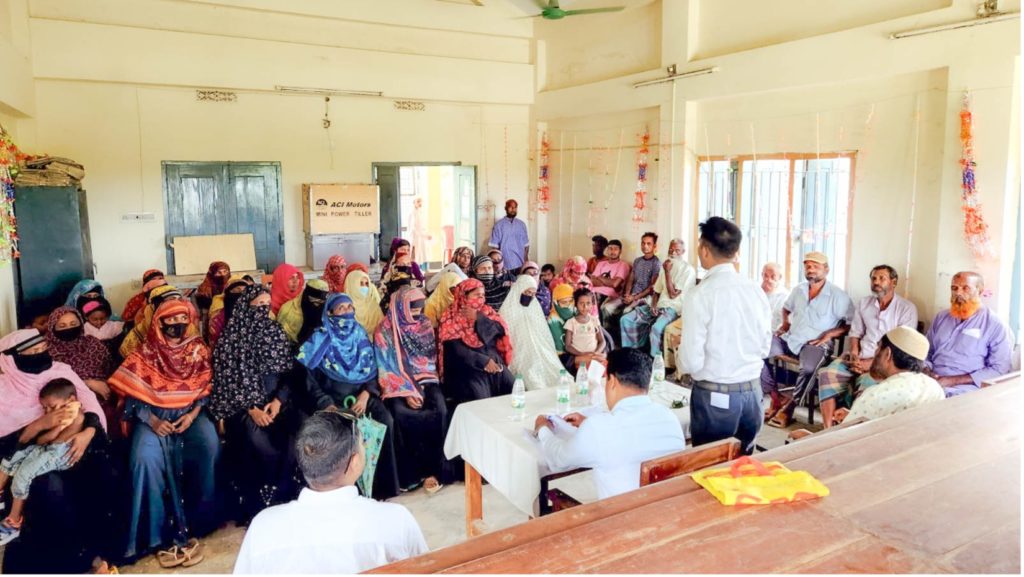
This meeting instilled a new perspective among farmers, positioning cooperatives as key to sustainable agricultural development and increased climate resilience in the future. Participants actively shared their opinions, asked questions, and expressed interest in engaging in the proposed activities.
What stood out most was the visible initiative from government institutions. The Department of Cooperatives came prepared with a proposed name for the cooperative and even a printed banner, signaling true ownership and intention. The combined presence of government officials and the Union Parishad Chairman reflected not just endorsement, but a deeper commitment to supporting grassroots agricultural development.
This kind of multi-level engagement—where both the Department of Cooperatives and the local Union Parishad are actively involved—sends a strong signal. It represents a promising beginning for building sustainable, climate-resilient, farmer-led cooperatives. Government backing is essential for unlocking long-term benefits and ensuring that public resources reach the people who need them most.
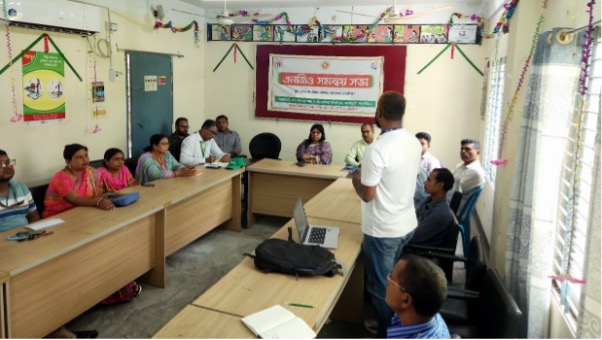
by emilie.cremin@gmail.com | May 20, 2025 | Previous Events
Assasuni, Satkhira — 20 May 2025
An NGO Coordination Meeting was held on 20 May 2025 in Assasuni, bringing together key government officials and representatives from a multitude of development organisations working in the region.
Showcasing ENGAGE’s Work in Pratapnagar
A significant highlight of the session was a presentation by Sabbir Ahmed, Living lab Manager, representing SAJIDA Foundation. He provided a comprehensive overview of the ongoing and planned project activities in Pratapnagar, detailing the research to experimentation initiatives currently underway. The presentation explained why Pratapnagar was chosen as a focal area and described how the ENGAGE project is working in collaboration with local farmers, entrepreneurs and union council showcasing their involvement in agroecological intervetions.
Following the presentation, the UNO encouraged open dialogue and invited questions from attendees. A key discussion point emerged around whether SAJIDA Foundation’s agro-processing and agricultural development plans would remain confined to Pratapnagar or expand to other areas.
Call for Collaboration and Future Focus
Rafiqul Islam, the Upazila Social Services Officer, appreciated SAJIDA Foundation’s research-based approach, noting that such initiatives are unprecedented in the region. He urged all stakeholders to actively support this initiative. He further emphasised the urgent need for research on women’s health in saline-affected areas, highlighting that women in several unions of Assasuni are experiencing complex health issues due to high salinity in water, encouraging future research in this area. 
Notably, Nazmus Sakib, the Upazila Agriculture Officer, shared that his department is planning to scale up sunflower cultivation in Pratapnagar. He explored the possibility of collaboration on this initiative and discussed areas where joint support could strengthen the impact.
Other NGOs participated in the dialogue, expressed their interest to learn more about ENGAGE’s approach, value addition and market linkage approach and ask if there are opportunities for collaboration especially on the value addition and market linkage initiatives.
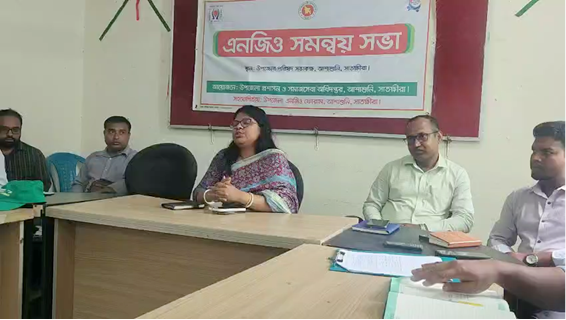
In her closing remarks, UNO Krishna Roy thanked SAJIDA Foundation for their meaningful research contributions and provided guidance on expanding their scope to address women’s health in saline-prone regions. She also stressed the importance of sharing research findings with relevant government departments to ensure effective policy and programme integration.
This meeting marks a significant step toward strengthening collaboration between the government and NGOs in Assasuni, with a shared commitment to sustainable development, community resilience, and research to action.
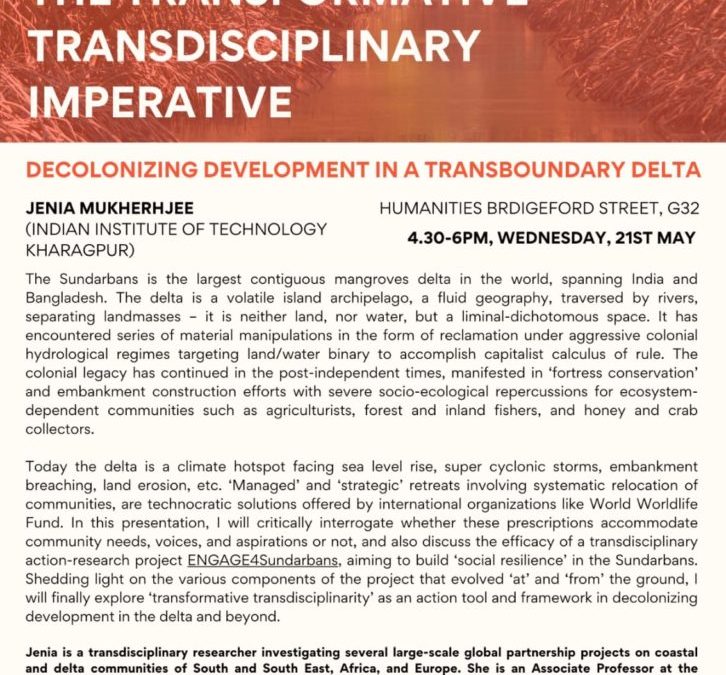
by emilie.cremin@gmail.com | May 18, 2025 | Previous Events
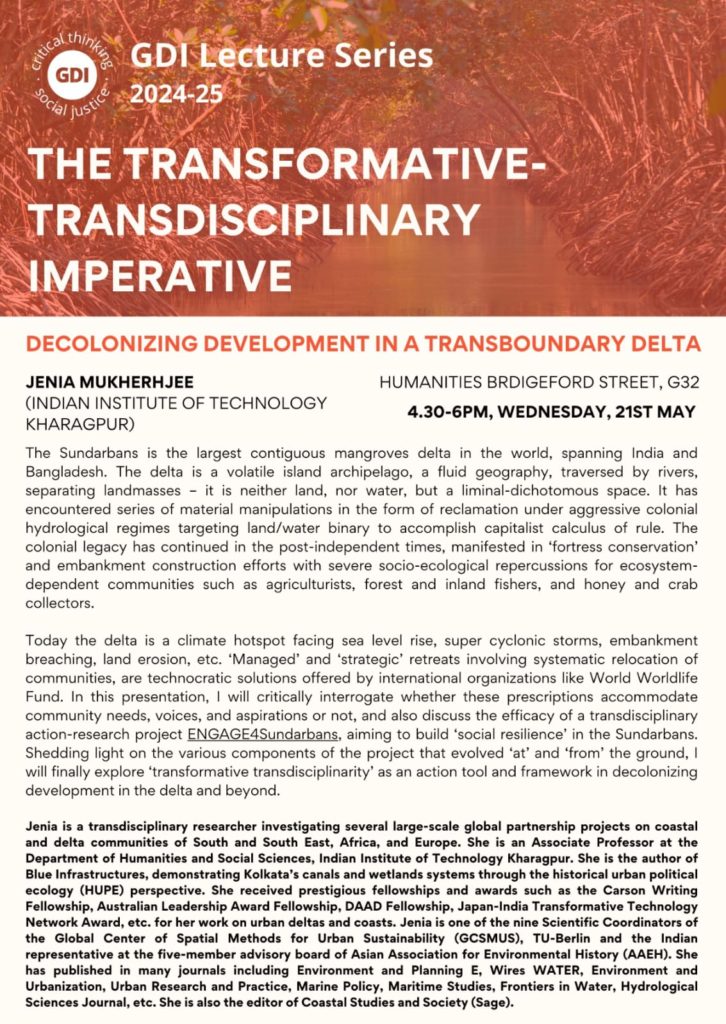
DECOLONIZING DEVELOPMENT IN A TRANSBOUNDARY DELTA –
JENIA MUKHERJEE (INDIAN INSTITUTE OF TECHNOLOGY KHARAGPUR)
Location : HUMANITIES BRIGEFORD STREET, G32 4.30-6PM, WEDNESDAY, 21ST MAY
The Sundarbans is the largest contiguous mangrove delta in the world, spanning India and Bangladesh. The delta is a volatile island archipelago, a fluid geography, traversed by rivers, separating landmasses – it is neither land nor water, but a liminal-dichotomous space. It has encountered a series of material manipulations in the form of reclamation under aggressive colonial hydrological regimes targeting the land/water binary to accomplish the capitalist calculus of rule. The colonial legacy has continued in the post-independent times, manifested in ‘fortress conservation’ and embankment construction efforts with severe socio-ecological repercussions for ecosystem-dependent communities such as agriculturists, forest and inland fishers, and honey and crab collectors.
Today the delta is a climate hotspot facing sea level rise, super cyclonic storms, embankment breaching, land erosion, etc. ‘Managed’ and ‘strategic’ retreats involving systematic relocation of communities, are technocratic solutions offered by international organizations like World Worldlife Fund. In this presentation, I will critically interrogate whether these prescriptions accommodate community needs, voices, and aspirations or not, and also discuss the efficacy of a transdisciplinary action-research project ENGAGESundarbans, aiming to build ‘social resilience’ in the Sundarbans.
Shedding light on the various components of the project that evolved ‘at’ and ‘from’ the ground, I will finally explore ‘transformative transdisciplinarity’ as an action tool and framework in decolonizing development in the delta and beyond.
Jenia is a transdisciplinary researcher investigating several large-scale global partnership projects on coastal and delta communities of South and South East, Africa, and Europe. She is an Associate Professor at the Department of Humanities and Social Sciences, Indian Institute of Technology Kharagpur. She is the author of Blue Infrastructures, demonstrating Kolkata’s canals and wetlands systems through the historical urban political ecology (HUPE) perspective. She received prestigious fellowships and awards such as the Carson Writing Fellowship, Australian Leadership Award Fellowship, DAAD Fellowship, Japan-India Transformative Technology Network Award, etc. for her work on urban deltas and coasts. Jenia is one of the nine Scientific Coordinators of the Global Center of Spatial Methods for Urban Sustainability (GCSMUS, TU-Berlin and the Indian representative at the five-member advisory board of Asian Association for Environmental History (AAEH). She has published in many journals including Environment and Planning E, Wires WATER, Environment and Urbanization, Urban Research and Practice, Marine Policy, Maritime Studies, Frontiers in Water, Hydrological Sciences Journal, etc. She is also the editor of Coastal Studies and Society (Sage).
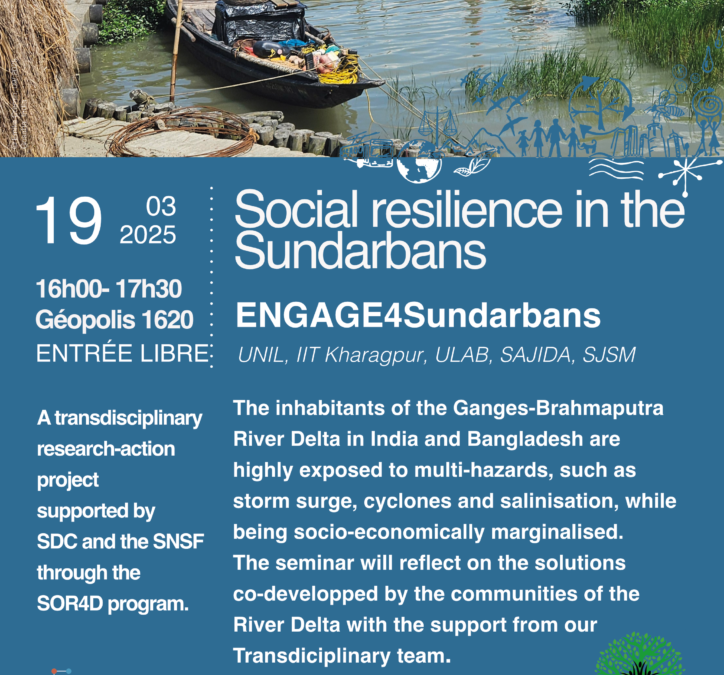
by emilie.cremin@gmail.com | Mar 19, 2025 | Previous Events
Wednesday, 19th of March 2025, 4 pm to 5.30 pm: UNIL Room 1620, Geopolis
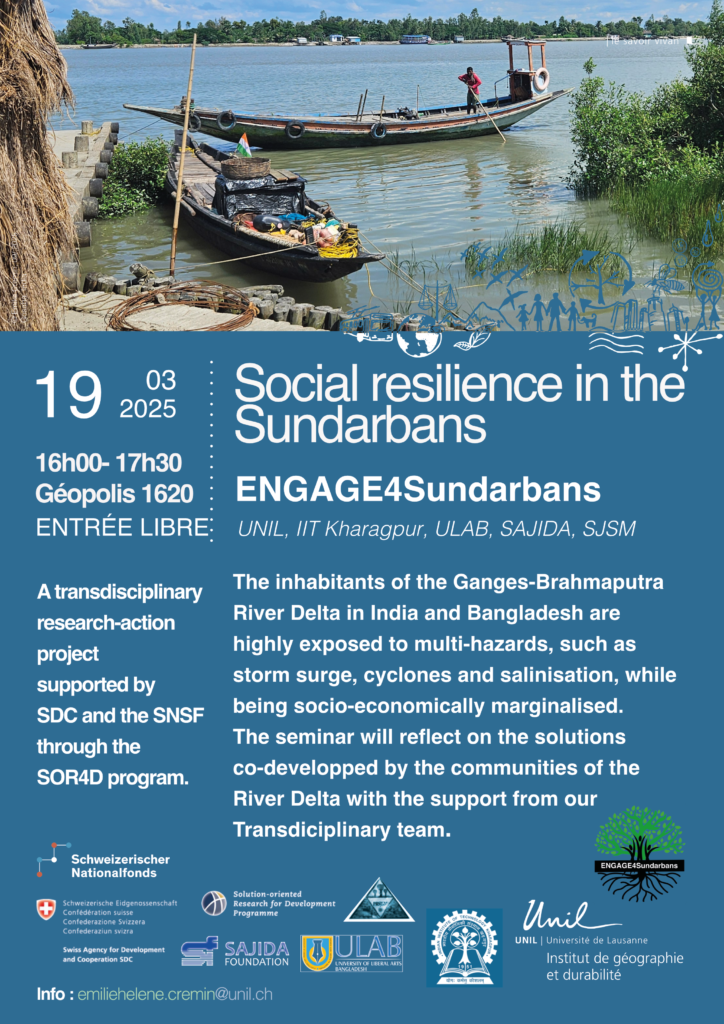
Open event
Conference at UNIL Geopolis
The conference is open to the public
The event will be followed by a small “Apéro”
Location: Auditorium 1620, Geopolis, UNIL Mouline, 70 seats.
The event is open to the public: students, researchers, practitioners, and citizens.










